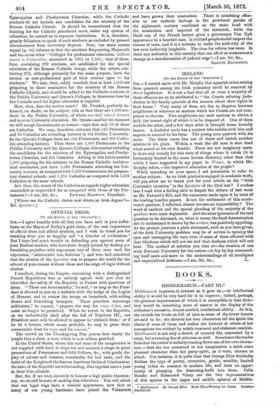OFFICIAL DRESS.
rTO THB EDITOR OF THE " SPECTATOR:1 SIR,—I agree heartily with all that you have said in your reflec- tions on the Mayor of Batley's gold chain, of the real importance of official dress and official symbols, and I wish to thank you for resisting what you so happily call "a blunder of civilization." But I have had much trouble in defending you against some of your Radical readers, who have been deeply pained by finding you furnishing prejudice with arguments (one of them even used the expression, "aristocratic tom fooleries "), and who had conceived that the mission of the Spectator was to prepare the world for the advent of pure reason without dress and the reign of logic without clothes.
I recollect, during the Empire, conversing with a distinguished French Republican who so entirely agreed with you that he identified the safety of the Republic in France with questions of dress. "There can be no security," he said, "as long as the Presi- dent is allowed to put on a uniform with the badge of the Legion of Honour, and to review the troops on horseback, with rolling drums and flourishing trumpets. These practices encourage militarism," be argued, "prepare the way for coups d'itat, and must no longer be permitted. When we revert to the Republic, as we undoubtedly shall after the fall of Napoleon III., our President must only be allowed to appear in citizen's dress ;' or if he be a lawyer, which seems probable, he may in great State ceremonials wear his toque and his sinuirre."
The crowd on the Thanksgiving Day proves low dearly the people love a show, a taste which is now seldom gratified.
In the United States, where this real want of the imagination is not supplied with food, it crops out and assumes a shape in great processions of Freemasons and Odd-Fellows, &c., with gaudy dis- play of colours and banners, remarkable for bad taste, and the heirs of the Knights of the famous American Order of Cincinnatus, the laws of the Republic notwithstanding, dine together once a year in their blue ribands.
But, Sir, if we wish sincerely to honour a high public function- ary, we should beware of making him ridiculous. You will admit that our legal wigs have a comical appearance, now that so many of our young barristers have joined the Volunteers and have grown their mustachios. There is something offen- sive to our assthetic feelings in the powdered peruke of the eighteenth century combined on the same head with the mustachios and imperial of the sixteenth, while the black cap of the French lawyer gives a picturesque Van Dyk appearance to a bearded man. A civilized people should respect the. canons of taste, and it is a mistake to make the authority of the law even indirectly laughable. The time for reform has come. Is there any authority in this country that can effect so momentous a‘ change as a transformation of judicial wigs ?—I am, Sir, Ste.,
SARTOR RESARTUE.


































 Previous page
Previous page